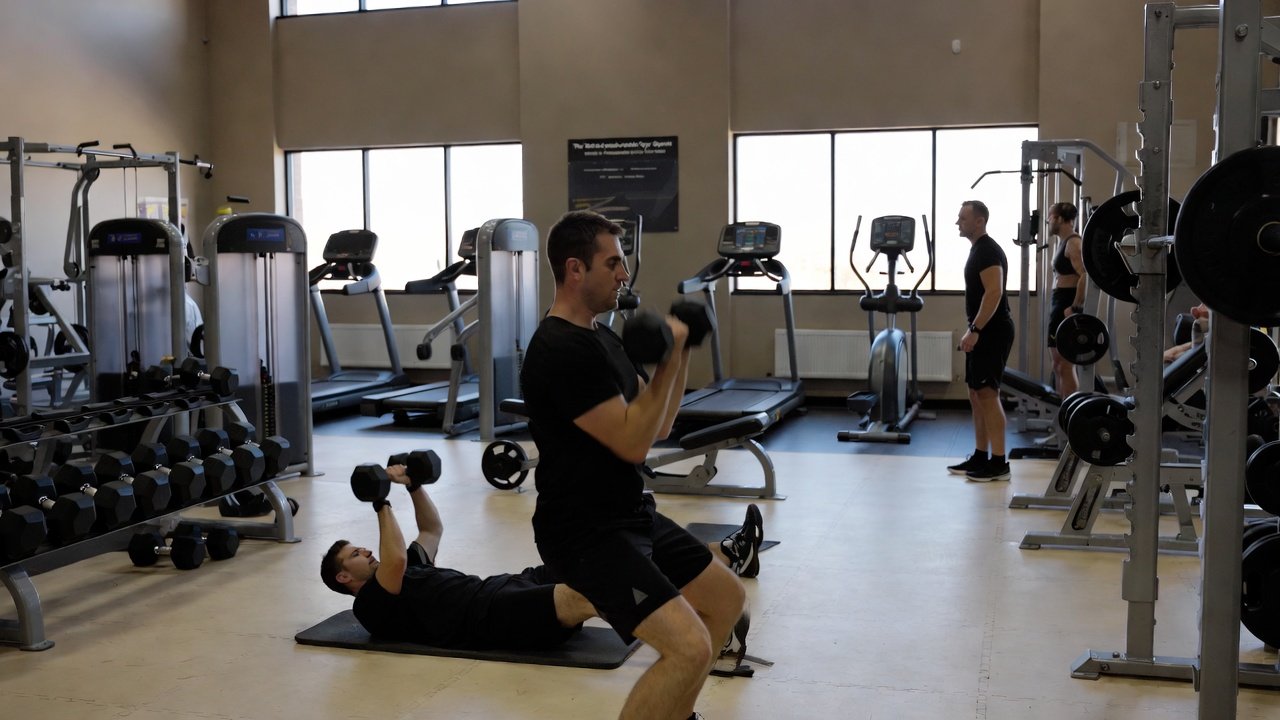When it comes to fitness supplements, creatine holds a special place. Recognized as one of the most extensively studied supplements in the fitness industry, Creatine offers a wide array of benefits for athletes, bodybuilders, and fitness enthusiasts alike. Understanding its function and effects can help you make informed decisions about your supplementation strategy.
Creatine is often associated with improved strength and muscle mass. However, its benefits extend beyond just these physical attributes. This article delves into the science of creatine, helping you comprehend its role in your fitness regimen. By understanding the fundamentals, you can better decide whether creatine is right for you.
Whether you’re new to the world of fitness or a seasoned athlete, knowing the ins and outs of creatine can significantly impact your performance and results. Let’s explore what creatine is, how it works, and why it might be a valuable addition to your fitness routine.
What is Creatine and How Does It Work?
Creatine is a naturally occurring compound found in small amounts in certain foods and synthesized in your body. It primarily resides in muscle cells, where it plays a crucial role in energy production. By replenishing adenosine triphosphate (ATP), the primary energy carrier, creatine ensures that your muscles have the fuel they need to perform short bursts of high-intensity activities.
When you consume creatine, it increases the phosphocreatine stores in your muscles. This, in turn, aids in the rapid production of ATP, particularly during high-intensity exercises like weightlifting or sprinting. With enhanced ATP availability, your muscles can sustain higher levels of exertion for more extended periods, leading to improved performance and increased strength.
The mechanism by which creatine operates is straightforward yet powerful. By boosting your body’s ATP levels, it enables you to push harder during workouts, ultimately leading to more significant gains in muscle mass and strength. The increased energy availability also aids in quicker recovery between sets, allowing for more effective training sessions.
The Science Behind Creatine: Research and Studies
The efficacy of creatine as a supplement is backed by extensive scientific research. Numerous studies have demonstrated its ability to enhance muscle strength, power, and mass. Research indicates that creatine supplementation can lead to a 5-15% improvement in strength and performance in high-intensity training.
One of the most compelling aspects of creatine is its wide applicability. Studies show that it benefits both young individuals and older adults, proving its versatility as a supplement. For older adults, creatine can help combat age-related muscle loss, improving overall physical health and quality of life.
Moreover, research suggests that creatine may have cognitive benefits. Some studies indicate that it can enhance brain function, particularly in tasks that require short-term memory and quick thinking. This potential cognitive boost adds another layer of appeal to creatine, making it a supplement worth considering for both physical and mental enhancement.
Benefits of Creatine for Fitness Enthusiasts
Creatine is renowned for its ability to support muscle growth. It enhances your body’s capacity to perform high-intensity workouts, leading to increased muscle mass. By promoting the synthesis of proteins and reducing muscle breakdown, creatine helps you achieve your muscle-building goals more efficiently.
In addition to muscle growth, creatine improves overall strength and power. By increasing ATP production, it provides the energy needed for explosive movements and heavy lifting. This makes it an invaluable supplement for athletes and weightlifters aiming to enhance their performance and reach new personal bests.
Beyond strength and muscle gains, creatine offers quicker recovery times. It helps reduce muscle soreness and fatigue after intense workouts, allowing you to maintain a consistent training schedule. This faster recovery not only enhances your performance but also reduces the risk of injury, ensuring long-term success in your fitness journey.
How to Properly Use Creatine: Dosage and Timing
To maximize the benefits of creatine, it’s essential to understand the appropriate dosage and timing. The most common approach is to start with a loading phase, where you consume 20 grams of creatine daily for 5-7 days. This phase saturates your muscles with creatine, ensuring optimal levels for performance enhancement.
After the loading phase, a maintenance dose of 3-5 grams per day is recommended. This amount is sufficient to maintain elevated creatine levels in your muscles. Consistency is key, so make sure to take your daily dose, preferably at the same time each day, to ensure steady levels.
Timing can also play a role in maximizing creatine’s effects. While there is no definitive answer, many experts suggest taking creatine around your workout time to enhance absorption. Pairing it with carbohydrates can further increase uptake, as insulin spikes help transport creatine into muscle cells more effectively.
Different Forms of Creatine: Which One is Right for You?
Creatine comes in various forms, each with its unique characteristics. The most popular and well-researched form is creatine monohydrate. Known for its effectiveness and affordability, it remains the preferred choice for most fitness enthusiasts.
Other forms include creatine ethyl ester, creatine hydrochloride, and buffered creatine. Each of these claims offer specific benefits, such as improved solubility or reduced bloating. However, research consistently shows that creatine monohydrate provides the same, if not better, results at a lower cost.
When choosing a creatine supplement, consider your personal preferences and budget. While other forms might offer slight advantages in terms of absorption, creatine monohydrate’s extensive research and proven effectiveness make it a reliable option for most users.
Common Myths and Misconceptions About Creatine
Despite its popularity, Creatine is surrounded by various myths and misconceptions. One common myth is that creatine is a steroid. In reality, creatine is a naturally occurring compound found in foods like meat and fish. It is not a hormone and does not have side effects associated with steroid use.
Another misconception is that creatine causes dehydration or kidney damage. Studies have shown that when taken at recommended dosages, creatine does not harm kidney function in healthy individuals. Additionally, proper hydration can mitigate any potential risk of dehydration.
Some people believe that creatine leads to excessive weight gain. While creatine can cause a temporary increase in water retention, this is not the same as fat gain. The weight gain associated with creatine is primarily due to increased muscle mass and water content in muscle cells, contributing positively to overall physique and performance.
Potential Side Effects and Safety Considerations
Creatine is generally safe for most individuals when used correctly. However, some people may experience mild side effects such as bloating, stomach discomfort, or muscle cramping. These can often be minimized by ensuring adequate hydration and not exceeding the recommended dose.
For individuals with pre-existing kidney conditions, it’s advisable to consult a healthcare professional before starting creatine supplementation. While research indicates that creatine does not adversely affect kidney function in healthy people, caution is warranted for those with kidney issues.
Long-term studies on creatine use have shown it to be safe and effective. However, as with any supplement, it’s essential to use it responsibly and as part of a balanced diet and exercise program. Monitoring your body’s response and consulting with a healthcare provider can further ensure safe supplementation.
Creatine and Its Role in Different Types of Workouts
Creatine’s benefits extend across various types of workouts, making it a versatile supplement for athletes and fitness enthusiasts. In resistance training, creatine helps improve strength and muscle mass, allowing you to lift heavier weights and perform more repetitions.
For high-intensity interval training (HIIT), creatine enhances performance by providing the energy needed for quick, explosive movements. It helps you maintain intensity throughout your sessions, leading to greater calorie burn and improved cardiovascular fitness.
Endurance athletes can also benefit from creatine, although its effects may be less pronounced than in strength-based activities. By improving recovery and reducing muscle fatigue, creatine allows endurance athletes to train more frequently and with greater intensity, ultimately enhancing overall performance.
Conclusion: Is Creatine Right for Your Fitness Journey?
Deciding to incorporate creatine into your fitness routine requires consideration of your goals, training style, and overall health. If you’re looking to increase muscle mass, strength, and performance, creatine is a well-researched supplement that offers significant benefits.
For those concerned about safety, creatine has been proven to be safe for healthy individuals when used correctly. Its cost-effectiveness and extensive research make it a worthwhile addition to many fitness programs. Always consult with a healthcare provider if you have any pre-existing health conditions or concerns.
As you evaluate your supplementation strategy, consider how creatine aligns with your fitness objectives. If you’re ready to enhance your training and achieve new milestones, creatine could be the key to unlocking your potential. Remember, consistency and proper usage are crucial for maximizing its benefits.
Please review our business on Google Yelp Facebook
Please visit our Members’ Area to access 100s of health and fitness topics.
Did you know you can work out and exercise with a trainer at your home, office, hotel room, or anywhere in the world with online personal training?
Like us on Facebook/Connect with us on LinkedIn/Follow us on X
Make sure to forward this to friends and followers!






